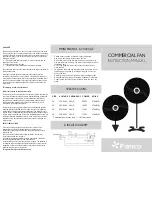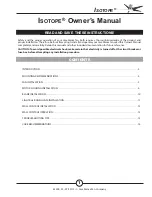
MVA 02 rev 5 - December 2017
61 of 120
For guards in pressed and painted sheet metal, checks must be made for the following:
Corrosion or dullness of painted surfaces
Detachment of rivets/welds
Evidence of noises typical of loose guards
Impacts and permanent deformation of components
Mechanical deformation or breakage of guards
Presence of cracks
Corrosion of fasteners
Slackening of fixing elements
CAUTION:
All guards must be inspected every month and replaced if necessary.
CAUTION:
In case of doubts, carry out checks more frequently or replace the guard.
6.2.2
Checking and cleaning parts in contact with fluids
The periodical cleaning of the impeller prevents vibrations that might be caused by any dust deposits that
accumulate while the fan is running.
If the fan is used for the movement of even slightly dusty fluids, the Impeller must by inspected
periodically for cleanness and/or wear.
Deposits of material or wear on impeller parts may cause abnormal fan vibrations.
6.2.3
Visual checks on impeller and casing
Periodical visual checks must be made for wear on impeller blades, given that deterioration of these parts
can create a condition of extreme risk, due to the ejection of the blade or the failure of structural
components, with consequences that may even be fatal.
CAUTION:
Axial fans must not be used for fluids containing abrasive agents.
To monitor
phenomena of accidental abrasion
on impeller blades and the casing, use a portable lamp to
visually inspect components, slowly rotating the impeller to allow all blades to be seen. Blades must be
totally free from damage and must show no signs or abrasion or missing sections.
With regard to the
phenomenon of corrosion
on impeller blades and the casing, corrosive and acidic
environments can reduce the thickness of fan safety components.
This phenomenon must not be underestimated, also because it does not depend solely on the concentration
of aggressive agents.
Condensation may form during pauses in fan operation, and this may accelerate the phenomenon of
chemical corrosion, which in turn may alter the thickness of components, affecting their integrity.
















































